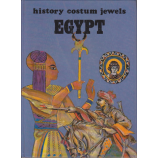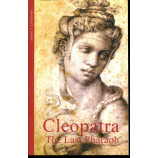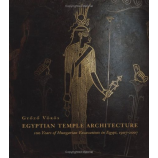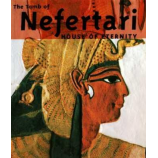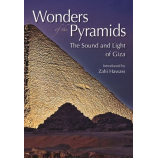Egypt
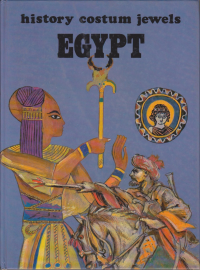
USED BOOK
Author: al-Ahram
Publisher: al-Ahram
Publication Date: 0000-00-00
ISBN: B0007ANPJ6
Binding: Hardcover
Language: English
Price: 35.00
ABC of Egypt (history, costume, jewels)
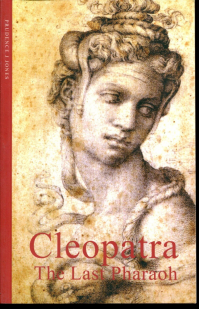
NEW BOOK
Author: Prudence Jones
Publisher: the American University in Cairo Press
Publication Date: 2006-01-01
ISBN: 9774249933
Binding: Paperback
Language: English
Price: 55.00
Cleopatra: The Last Pharaoh
Cleopatra VII (69-30 BC) was the last monarch of the Ptolemaic dynasty in Egypt. Daughter of Ptolemy XII, she ruled with her two brother-husbands, Ptolemy XII and Ptolemy XIV, both of whom she had killed, and with her son Ptolemy XV or Caesarion (44-30 BC). This new biography illustrates in full color the fascinating aspect of Cleopatra's ever-shifting identity. Depending on the audience, she might present herself as a goddess, a political leader, or an alluring and exotic woman. Roman statesmen likewise manipulated Cleopatra's image for their own political ends. Author Prudence Jones, an assistant professor at Montclair State University, also wrote "Cleopatra: A Sourcebook."
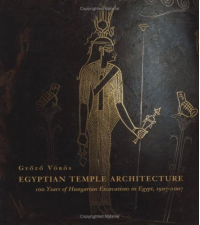
NEW BOOK
Author: Gyozo Vörös
Publisher: The American University in Cairo Press
Publication Date: 2008-06-01
ISBN: 9636620849
Binding: Hardcover
Language: English
Price: 75.00
Egyptian Temple Architecture
This jubilee book celebrates a century of Hungarian excavations in Egypt, which began on 1 January 1907 with the first of nine archaeological missions over four academic generations. Through the beautifully illustrated pages of this centenary volume, the reader becomes acquainted with the archaeological work of L·szlû Alm·sy, F¸lˆp Back, L·szlû Castiglione, Gèza Fehèrv·ri, Gyula Hajnûczi, Gyula Istv·nfi, L·szlû K·kosy, and Imre Makovecz.
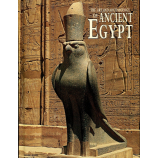
Giorgio Agnese, Maurizio Re
Price: 75.00 L.E
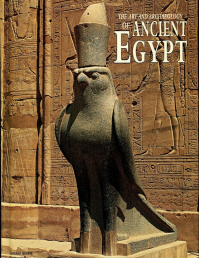
NEW BOOK
Author: Giorgio Agnese, Maurizio Re
Publisher: The American University in Cairo Press
Publication Date: 2004-01-01
ISBN: 9774248805
Binding: Hardcover
Language: English
Price: 75.00
The Art & Archaeology of Ancient Egypt
The treasures of Pharaonic Egypt from Alexandria to Aswan
The Art and Archeology of Ancient Egypt explores and reveals the treasures of ancient Egypt from one end of the country to the other. Fully illustrated with excellent color photographs and historic prints, this book covers it all: a historical introduction and chronological listing of the pharaohs, the gods of ancient Egypt, the cult of the dead, hieroglyphic writing, travelers and explorers, the birth of modern archaeology, Alexandria, Tanis, the Giza plateau, the Egyptian Museum, Memphis, Saqqara, Dahshur, the oases of the Western Desert, Tell al-Amarna, Abydos, Dendera, Luxor, the temples of Western Thebes, the Theban necropolis, Esna, Edfu, Kom Ombo, Aswan, Philae, Abu Simbel and the Nubian temples, Serabit al-Khadem, and even a short section on the Monastery of St. Catherine. With captivating, concise text and hundreds of full-color illustrations, The Art and Archaeology of Ancient Egypt is the perfect gift or memento from a visit to Egypt.
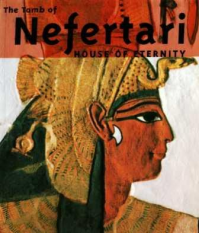
NEW BOOK
Author: John K. McDonald
Publisher: The American University in Cairo Press
Publication Date: 1996-01-01
ISBN: 9774243986
Binding: Paperback
Language: English
Price: 55.00
THE TOMB OF NEFERTARI: HOUSE OF ETERNITY
Nefertari, the favorite queen of Rameses II, was buried about 3,200 years ago in the most exquisitely decorated tomb in Egypt's Valley of the Queens. Discovered in 1904 by Italian explorer Ernesto Schiaparelli, the tomb had deteriorated to a disastrous extent when emergency consolidation began in 1986. The six-year conservation project of the GCI and the Egyptian Antiquities Organization was completed in 1992.
In this fascinating exploration of the tomb, John McDonald takes the reader through each chamber, describing the hieroglyphic messages depicted in the brilliant wall paintings and discussing the images within the context of Egyptian beliefs. He also offers insights into the life of Nefertari, the development and symbolism of royal tombs, and the construction and decoration of the tombs. House of Eternity is illustrated with historic black-and-white images and more recent color photographs that reveal the vibrant beauty of the wall paintings.
In November 1995 the tomb was reopened to the public. Because of the potential for damage and deterioration to the fragile wall paintings caused by increased humidity, carbon dioxide, and microbiological activity introduced by visitors to the tomb, the number permitted to enter daily is strictly controlled by the Egyptian authorities. This book results from a desire of the GCI to enrich visitors' experience by providing a detailed descriptive walk-through of the tomb while conveying a strong message regarding the need for conservation and continuous monitoring to ensure the long-term survival of the tomb's paintings.
Visitors to the tomb and the armchair traveler alike will find House of Eternity to be an excellent resource for understanding Nefertari's journey to the afterlife and for appreciating the extraordinary depictions of that journey on the walls of Nefertari's tomb.

NEW BOOK
Author: E.M. Forster
Publisher: The American University in Cairo Press
Publication Date: 2004-01-01
ISBN: 9774248503
Binding: Hardcover
Language: English
Price: 95.00
Alexandria: A History and Guide
The aim of the Abinger Editions is to provide a new, properly edited library of the literary works of E.M. Forster that does justice to his literary genius. The latest in the series is Alexandria, written while Forster was in Egypt during the First World War. This edition collates and compares all the existing editions of the work to provide the definitive version of the text. It also contains the subsequent work by Forster, Pharos and Pharillon.
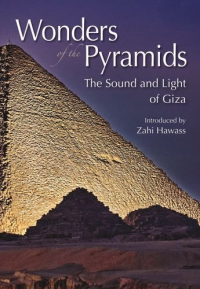
NEW BOOK
Author: Zahi Hawass
Publisher: the American University in Cairo Press
Publication Date: 2010-09-15
ISBN: 9771780271
Binding: paperback
Language: English
Price: 40.00
Wonders of the Pyramids
A visit to the magnificent Pyramids of Giza, the one remaining Wonder of the ancient world, is incomplete without enjoying the performance of the spectacular Sound & Light Show of music, historical narration, and lights and images played out on the ancient stones themselves.
These new, full-color presentations serve as the ideal record—or foretaste—of the Sound & Light experience, with a historical introduction by internationally renowned Egyptologist Zahi Hawass, and the complete script of the show, accompanied by over 60 beautiful photographs of the light show, the monuments themselves, and the ancient sites of the surrounding region.

